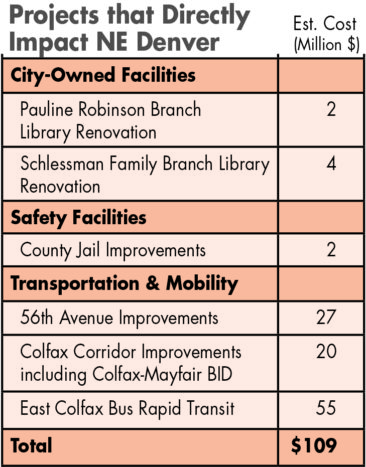The Denver City Council will be asking voters to approve issuance of $937 million in general obligation (GO) bonds at the Nov. 7 general election.
The Front Porch has reviewed the list of projects approved by the city council on August 8 and has extracted projects that directly serve taxpayers in our distribution area (see tables above and right). Local taxpayers would also benefit from several citywide programs such as sidewalk construction and major street repaving. Decisions on individual projects within those programs would be made in the future.
Project and program selection for the 2017 package were determined through an extensive public input process that began last fall and culminated in June with a recommendation to the mayor and city council by an appointed bond committee. Throughout this process, city leaders often described their overall approach in project selection as based on a combination of need and “equity,” meaning a fair distribution of projects throughout the city.
No property tax increase is proposed; the city estimates it can retire these GO bonds with the existing 8.433 mill levy already in place. The impact on an owner of the median Denver single-family home is estimated at $219 annually (median home value of $360,000 X 7.2% residential assessment rate X 8.433 debt mills).

Golf Course Impacts:
One project that did not make the final cut for the 2017 general obligation (GO) bond was a proposal for the city to acquire the 155-acre parcel where the Park Hill Golf Course is located. The land is owned by the Clayton Early Learning Trust, which uses revenue from its golf course lease to support its mission of early childhood education. The lease with Arcis Golf expires at the end of 2018, raising the prospect that the golf course could close as Clayton explores other land uses that could generate more income. Clayton wants to adopt a new vision for its property by this November, giving it time to put the new plan into place before the end of next year. The most recent community open house to develop that vision was held Aug. 10.
Community members advocating for city acquisition of the site believe their effort to have the golf course included in the city’s 2017 GO bond failed for multiple reasons:
- Clayton’s planning efforts occurred several months after the city started identifying bond projects.
- The possibility remains that Clayton may retain some or all of the land as a golf course or open space.
- The city appears to have some leverage over the future of the golf course. It has a long-standing legal arrangement with Clayton to waive certain real property taxes in return for keeping the golf course land as open space.
The uncertainty about the Park Hill Golf Course future arises at the same time two other area-serving golf courses face closure:
Fitzsimons Golf Course:
The course is owned by the Fitzsimons Redevelopment Authority (FRA), the entity charged with redeveloping the former Fitzsimons Army Hospital site. It is operated by the City of Aurora under the terms of a lease that is subject to annual renewal. The course will be closed when the University of Colorado exercises a right to purchase land within the golf course and expand its campus north of Montview Blvd. Neither the city nor the FRA will give a specific date for course closure but it could happen as early as the 2019 season.
City Park Golf Course:
This Denver facility is scheduled to close for the 2018 season for a complete renovation including installation of storm drainage areas associated with the city’s Park to Platte project and the need to relocate the clubhouse. The city hopes to re-open the course sometime in 2019.




0 Comments